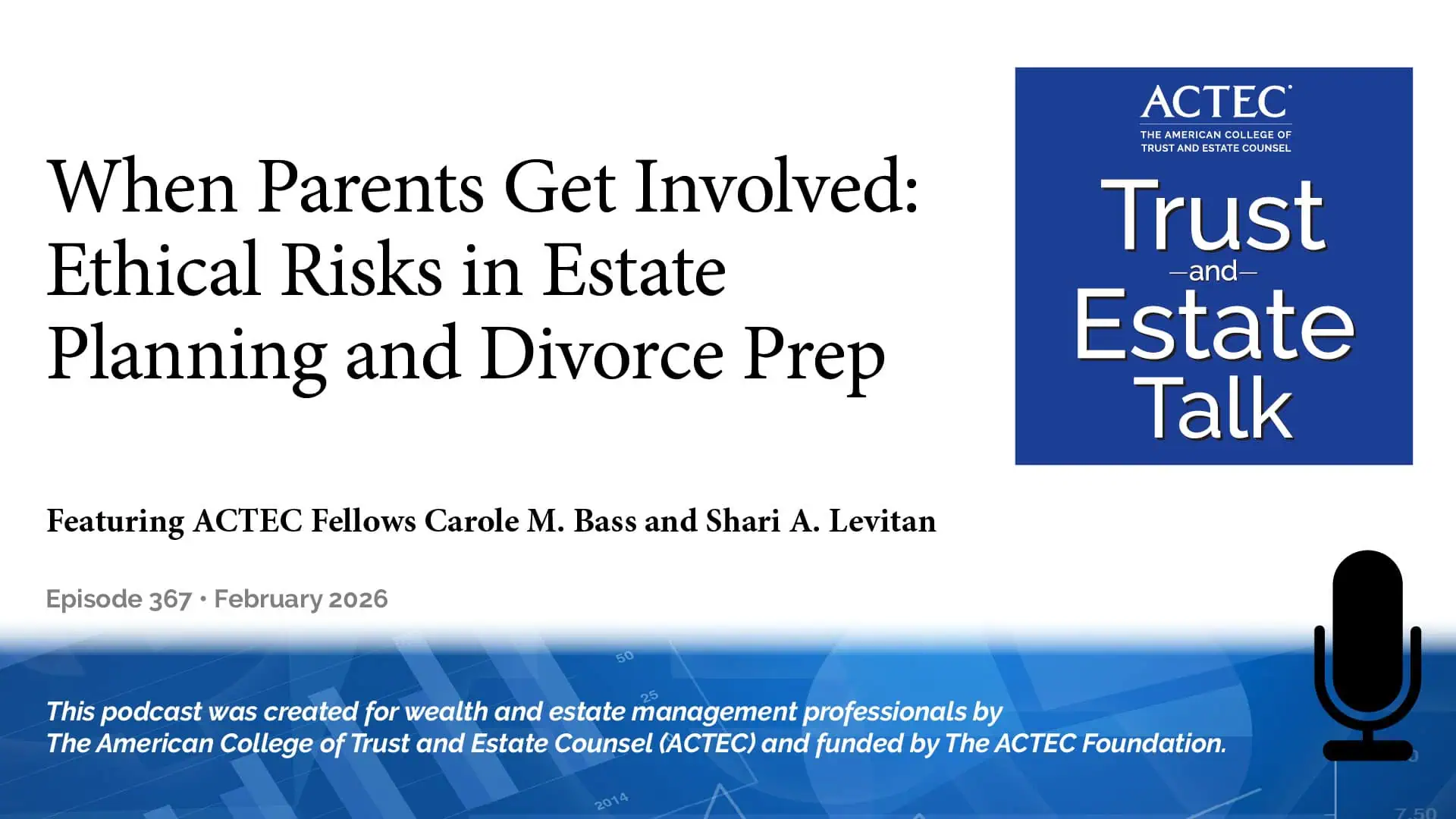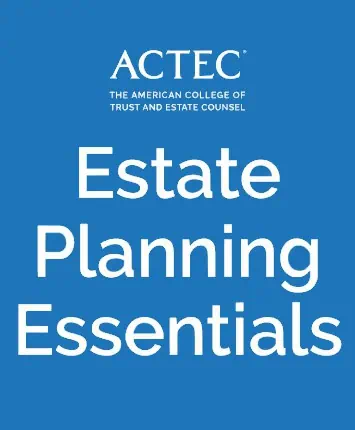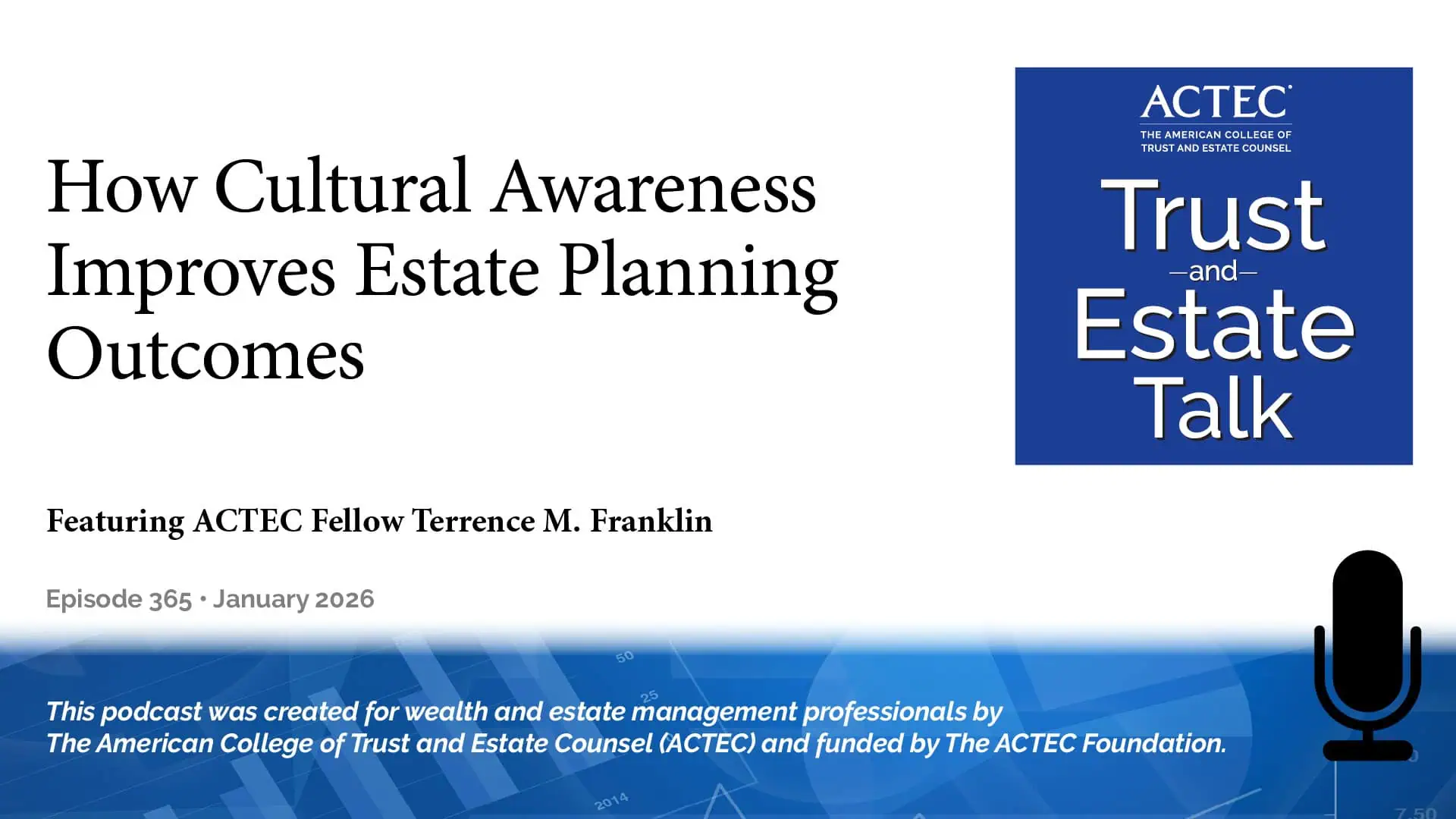Huffman Case Endangers Buy-Sell Agreements
“Huffman Case Endangers Buy-Sell Agreements,” that’s the subject of today’s ACTEC Trust and Estate Talk.
Transcript/Show Notes
This is Margaret Van Houten, ACTEC Fellow from West Des Moines, Iowa. The IRS did not respond favorably in the 2024 tax court case, Huffman v. Commissioner, when a son exercised an option to purchase stock from his parents and ignored a buy-sell agreement in the family-controlled business. That stock purchase triggered millions of dollars of gift tax.
ACTEC Fellow Steve Gorin from St. Louis, Missouri, reviews requirements for respecting a buy-sell agreement and suggests how to reduce the risk. Welcome, Steve.
Steve Gorin: Thank you, Margaret. It’s a pleasure to be here and talk about this very important case, which people don’t really talk about nearly enough.
Huffman v. Commissioner and Buy-Sell Agreement Caution
So in Huffman, the buy-sell agreement was ruled to have violated Internal Revenue Code Section 2703, and Code Section 2703 says that an agreement that will fix a price will not be respected by the IRS unless:
- it’s a bona fide business arrangement,
- it is not a device to transfer the property to members of the decedent’s family for less than full and adequate consideration and money or money’s worth, and
- its terms are comparable to similar arrangements entered into by persons in an arm’s length transaction.
Now, 2703 applies only if one person or a family has a majority of the equity in the company. So if you do have that particular situation, then you really need to be extra careful about things. But really, those first two requirements in 2703, saying that it needs to be bona fide and not being a device to get it just to your family members, that applies whether or not 2703 applies.
We have some pre-existing regulations that have been enforced for decades to talk about that rule. And the only thing that is new about 2703 is this comparability test. The idea it has to be comparable to similar arrangements entered into by persons in an arm’s length transaction.
Now, in the Huffman case, we had a son who worked in the family business, and he basically put a blood, sweat and tears in that family business. And the deal was, you know, hey, Mom or Dad, I’ll work in this, but I want to have a right to buy that stock from you so that if it’s a really successful business, I get the benefit from all my toil. And the right to buy it was actually significantly higher than the value at the time that they entered into this agreement. So basically, the parents would get a lot of the benefit of the increase in value. But if it got super successful, then the son would get the benefit of that super extraordinary success, I guess, kind of like “supercalifragilisticexpialidocious.”
So what happened was the taxpayer, it went up in value tremendously, and then when the son exercised the buy option, the IRS said this was a huge gift by the parents because they’re going to disregard the terms of the option and say they actually did a bargain sale. They sold it to the son for much less than it was worth and so there’s a big slug of gift tax due.
Using a Comparability Tool with Buy-Sell Agreements
So let’s talk about this comparability tool issue. The tax court said that this was a bona fide business arrangement and it was not a device. And normally, when you get past those two, the comparability is a shoo-in. But in this case, the taxpayer relied on an earlier buy-sell, and they didn’t have a copy of the earlier buy-sell with unrelated parties within the business. They didn’t have a copy of that. They just had reference to the terms of that provision. And that was the only evidence the taxpayer introduced. They did have the appraiser testify really very quickly about how it’s generally comparable, but they didn’t really provide a great grounds to say, well, this is how this agreement compares to other unrelated third parties.
The tax court basically said, look, that old buy-sell, whatever the terms were, is kind of sketchy. I don’t even necessarily agree with comparable and taxpayer you lose. So, could the taxpayer’s lawyer have done a better job, maybe putting on a lot more evidence? You know, I don’t want to go and throw rocks at the, as a litigator here, but that’s not really the lesson that I want you to take from Huffman.
Lessons Learned from Huffman v. Commissioner
The lesson from Huffman is that it’s a fact and circumstance situation, and it’s proof that you have to be able to do it. Now, a lot of litigators will put on an expert down the road and say, you know, here’s a corporate lawyer. The expert down the road says, this is something that’s that everybody does all the time. And then they’ll try to convince the court.
Now, when you’re drafting your buy-sell, I don’t think you want to really like hire an expert and go and get some kind of a big fancy opinion and everything and spend a lot of time on it. But I do think it would be a good idea to lay a good predicate for this. When you’re doing the buy-sell agreement, think about, you know, what’s kind of market out there? What is being done in the general community?
And we will all start with forms. The question is, are the forms that we use something that is used when it’s not a family business? So if you’re in a firm that has a lot of stuff that doesn’t involve family businesses, then you can go and go to that form, preserve the original form and make a note to the file that that form is what is being used for non-family businesses, and then when you go through the drafting, if you’re making changes to that form, document the business reasons for it. The business reasons that are not just related, trying to get some kind of a good deal to save estate tax. What are the true business concerns in making those changes to your form?
If you don’t have that internally, you could use a form system. And again, if that form system is something that is being held out there for general business situations, then that could be some kind of a predicate showing that, you know, hey, I was doing something that everybody else is doing. So, you can at least lay some evidence or a foundation for it and give yourself a head start in case some litigation may arise down the road in case IRS challenges this. I hope you find that helpful and look forward to discussing with you further if we ever have a chance. Thank you.
Margaret Van Houten: Thank you, Steve, for reminding us about this very important case.
Additional Resources
Latest ACTEC Trust and Estate Talk Podcasts

Estate Planning Considerations in Community Property States Relating to Retirement Accounts
Explore how community property laws shape IRAs, 401(k)s, beneficiary designations, and spousal rights in retirement account estate planning.

When Parents Get Involved: Ethical Risks in Estate Planning and Divorce Prep
When parents join prenup or divorce planning, ethical risks follow. ACTEC Fellows explore privilege, conflicts, and protecting the attorney-client relationship.

Useful But Overlooked Trusts: A Planner’s Guide to When and How to Use Them
Explore overlooked trusts—including HEETs, alimony, voting, and blind trusts—and when estate planners should use them to address complex client needs.



